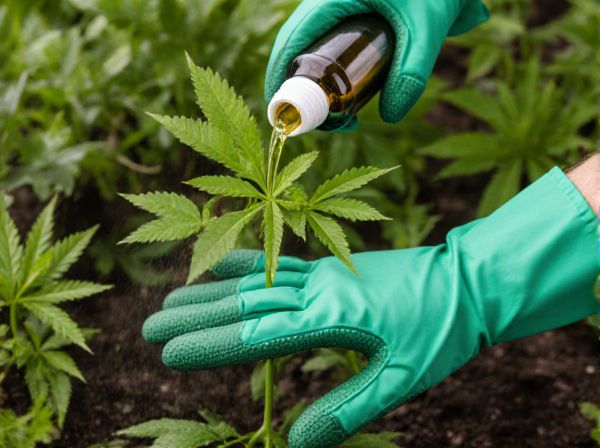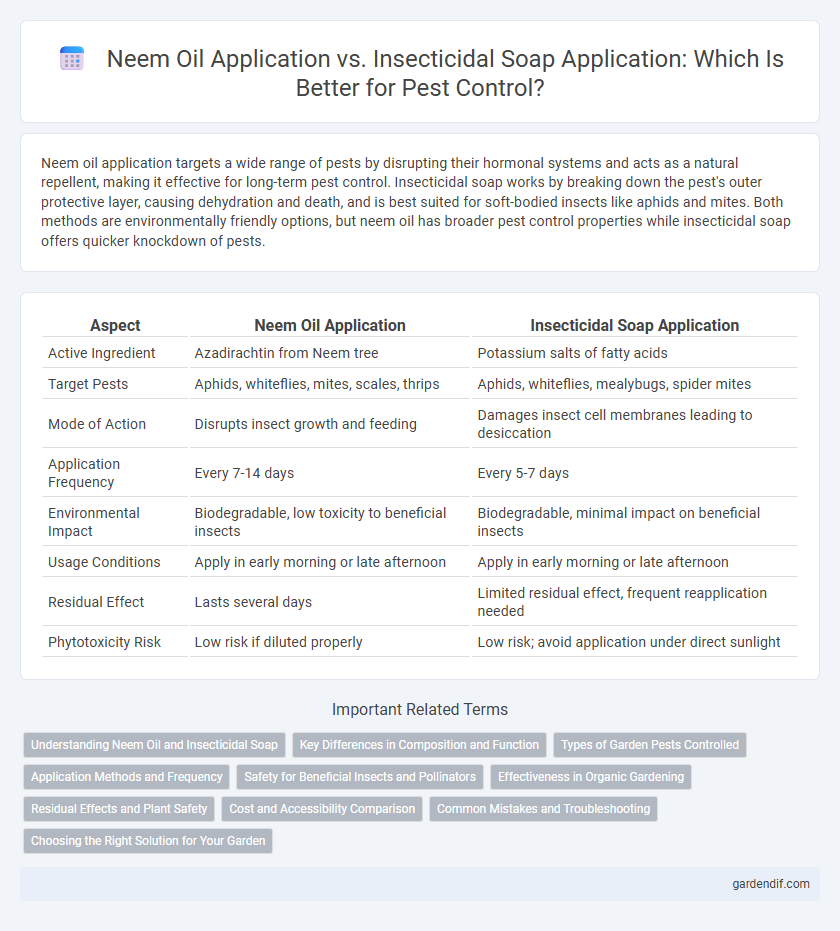
Neem oil application vs Insecticidal soap application Illustration
Neem oil application targets a wide range of pests by disrupting their hormonal systems and acts as a natural repellent, making it effective for long-term pest control. Insecticidal soap works by breaking down the pest's outer protective layer, causing dehydration and death, and is best suited for soft-bodied insects like aphids and mites. Both methods are environmentally friendly options, but neem oil has broader pest control properties while insecticidal soap offers quicker knockdown of pests.
Table of Comparison
| Aspect | Neem Oil Application | Insecticidal Soap Application |
|---|---|---|
| Active Ingredient | Azadirachtin from Neem tree | Potassium salts of fatty acids |
| Target Pests | Aphids, whiteflies, mites, scales, thrips | Aphids, whiteflies, mealybugs, spider mites |
| Mode of Action | Disrupts insect growth and feeding | Damages insect cell membranes leading to desiccation |
| Application Frequency | Every 7-14 days | Every 5-7 days |
| Environmental Impact | Biodegradable, low toxicity to beneficial insects | Biodegradable, minimal impact on beneficial insects |
| Usage Conditions | Apply in early morning or late afternoon | Apply in early morning or late afternoon |
| Residual Effect | Lasts several days | Limited residual effect, frequent reapplication needed |
| Phytotoxicity Risk | Low risk if diluted properly | Low risk; avoid application under direct sunlight |
Understanding Neem Oil and Insecticidal Soap
Neem oil is derived from the seeds of the Azadirachta indica tree and contains azadirachtin, a compound that disrupts the life cycle of insects, acting as a natural pesticide against aphids, whiteflies, and spider mites. Insecticidal soap, composed of potassium salts of fatty acids, works by penetrating and breaking down the insect's outer protective layer, causing dehydration and death, and is effective primarily on soft-bodied pests like aphids and mealybugs. Both treatments are favored in organic gardening but differ in modes of action and persistence, with neem oil offering systemic and residual effects while insecticidal soap provides rapid contact kill without long-lasting protection.
Key Differences in Composition and Function
Neem oil is a natural extract derived from the seeds of the Azadirachta indica tree, containing azadirachtin, which disrupts insect hormones and inhibits feeding and reproduction. Insecticidal soap consists of potassium salts of fatty acids that physically disrupt the cell membranes of soft-bodied insects, leading to dehydration and death. Neem oil provides systemic and long-lasting effects with repellant properties, while insecticidal soap acts quickly on contact but lacks residual activity.
Types of Garden Pests Controlled
Neem oil effectively targets a wide range of garden pests, including aphids, whiteflies, spider mites, and scale insects, by disrupting their hormonal systems and feeding behavior. Insecticidal soap primarily controls soft-bodied pests such as aphids, mealybugs, and spider mites by breaking down their protective outer coatings, leading to dehydration. Both treatments offer eco-friendly options, but neem oil offers broader pest spectrum control due to its systemic properties.
Application Methods and Frequency
Neem oil is typically applied as a foliar spray, targeting both the upper and lower leaf surfaces to maximize pest control, with applications recommended every 7 to 14 days depending on pest severity. Insecticidal soap is also sprayed directly onto affected plants but requires more frequent applications, often every 5 to 7 days, due to its rapid degradation from sunlight and rain. Both methods demand thorough coverage for effective results, though neem oil's residual properties allow for longer intervals between treatments.
Safety for Beneficial Insects and Pollinators
Neem oil is generally safer for beneficial insects and pollinators because it targets pests by disrupting their hormone systems without immediate lethal effects on non-target species. Insecticidal soaps primarily kill pests on contact by damaging cell membranes, which can harm beneficial insects if directly sprayed. Applying neem oil early in the morning or late evening reduces exposure to pollinators, enhancing safety compared to insecticidal soaps often applied during peak insect activity.
Effectiveness in Organic Gardening
Neem oil provides broad-spectrum pest control by disrupting insect hormone systems, making it highly effective against aphids, whiteflies, and spider mites in organic gardening. Insecticidal soaps work by physically disrupting and dehydrating soft-bodied pests but may require more frequent applications to maintain control. Both treatments are safe for beneficial insects when applied correctly, with neem oil offering longer-lasting protection due to its systemic properties.
Residual Effects and Plant Safety
Neem oil provides longer residual effects compared to insecticidal soap, effectively controlling pests for up to two weeks due to its systemic and antifeedant properties. Insecticidal soap offers rapid pest knockdown but requires frequent applications as it lacks substantial residual activity. Neem oil is generally safer for beneficial insects and less phytotoxic, while insecticidal soap may cause leaf burn or damage when applied under high temperatures or on sensitive plants.
Cost and Accessibility Comparison
Neem oil is generally more expensive than insecticidal soap, with prices ranging from $15 to $30 per quart, while insecticidal soaps typically cost between $10 and $20 per quart. Neem oil has moderate accessibility due to its growing popularity in organic farming but may not be as widely available in local stores compared to insecticidal soap, which is commonly found in garden centers and hardware stores. Insecticidal soap offers a cost-effective and readily accessible solution for pest control, whereas neem oil may require a higher initial investment but provides additional benefits such as antifungal properties.
Common Mistakes and Troubleshooting
Neem oil application often faces issues like over-application leading to leaf burn, and improper dilution reducing its effectiveness against pests such as aphids and whiteflies. Common mistakes with insecticidal soap include using hard water that diminishes soap's insecticidal properties and applying during peak sunlight, which can cause phytotoxicity. Troubleshooting involves adjusting application timing to early morning or late afternoon, ensuring correct dilution ratios, and testing on a small plant area to prevent damage.
Choosing the Right Solution for Your Garden
Neem oil effectively controls a wide range of garden pests including aphids, whiteflies, and spider mites by disrupting their feeding and reproduction cycles. Insecticidal soap offers rapid knockdown of soft-bodied insects like aphids and thrips, making it ideal for immediate pest infestation management. Selecting between neem oil and insecticidal soap depends on pest type, infestation severity, and environmental safety considerations to ensure optimal plant health and pest control.
Neem oil application vs Insecticidal soap application Infographic

 gardendif.com
gardendif.com